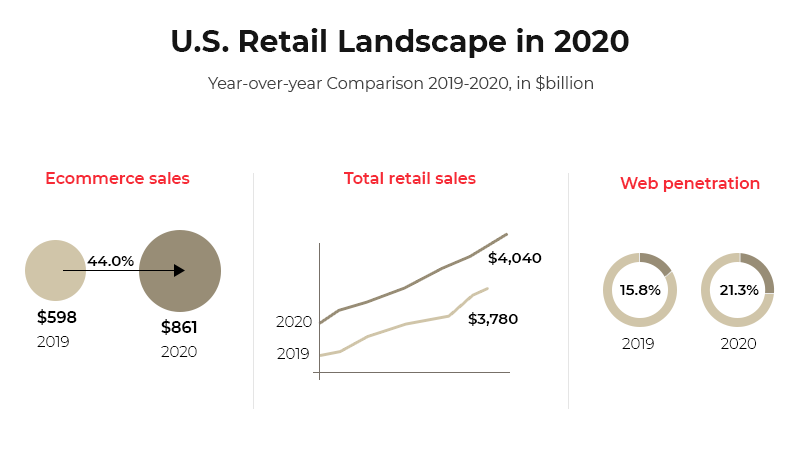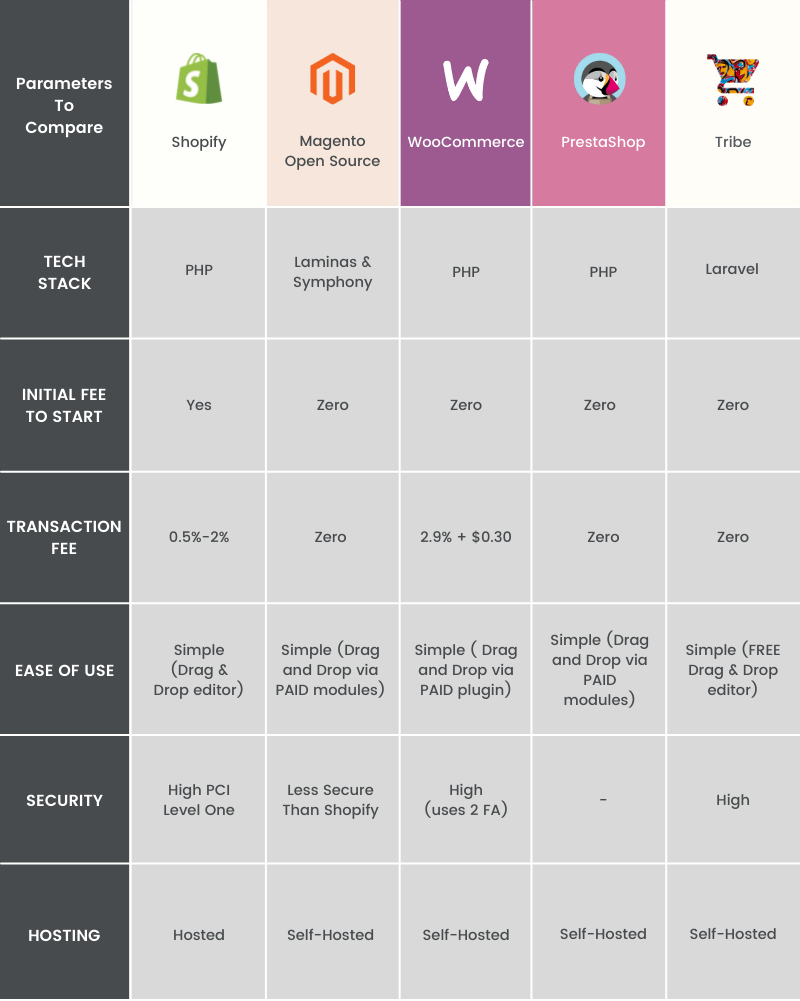eCommerce has revolutionized the way business is conducted across industries throughout the globe. Technological and logistical advancements have made the world a smaller place, ushering in the eCommerce era. eCommerce store software like Shopify, Magento and others, make it convenient for businesses to start their eCommerce store further facilitating the rise of eCommerce.
According to Statista, the number of digital buyers is increasing every year. In 2020, over two billion people purchased goods or services online. In the same year, e-retail sales from around the world surpassed $4.2 trillion.
Startups continue to leverage the power of digital transformation to have a share of the eCommerce market and established players continue to report an increase in business year after year. In the year 2020 Amazon made it to the second spot in Forbes list of top 10 companies all over the world. In the year 2020 alone, Amazon’s net revenue (consolidated) amounted to $386.06 bn. And this is roughly just 1% of the total global eCommerce market.
Rise Of eCommerce: How The Pandemic Has Expedited eCommerce Growth?
The rise of eCommerce businesses has been a silver lining in the pandemic cloud. The pandemic has confined people to their homes. As customers looked for alternatives, they turned to eCommerce stores. This further expedited the evolution of traditional brick-and-mortar stores to brick-and-click or simply an eCommerce business.
According to digital commerce 360 analysis, in the year 2020 consumers spent $861.12 billion on online shopping with U.S. retailers, this was an increment of 44.0% from $598.02 billion in 2019. Online spending was 21.3% of total retail sales in 2020, compared with 15.8% the year before it.
The pandemic factor has enhanced customer reach and the popularity of eCommerce stores. This further establishes their presence in the retail ecosystem, making their future brighter.

This trend has necessitated the transition traditional businesses need to make to meet their target customers where they prefer to shop.
There are several eCommerce platforms including Shopify, Magento, PrestaShop, WooCommerce in the market that offer good features and are competitive solutions to start an eCommerce store. But the key differentiating factors are the pain points that a startup or SMB will face when they start their e-store.
Let’s compare these top free eCommerce platforms and then there is also a bonus for you all! Keep reading to find out what is it.
Comparing Top E-commerce Platforms (2021)

Shopify is a SaaS-based eCommerce software for startups and SMB’s. It comes with a monthly fee, which means the bandwidth is not limited. The software is easier to use and loads up quickly. On the flip side though, it lacks certain SEO and content marketing features, checkout is not customizable and the apps are expensive.

Magento is another popular free open source eCommerce software. It is built using PHP. Just like PrestaShop, Magento’s installation takes time and getting used to it requires a steep learning curve. The software is scalable and supports multiple integrations but these extensions tend to be costly. Moreover, support is limited and paid.
These eCommerce software assist in accomplishing the same goal of setting up an eCommerce website. Examined below, are the differences in the package in which they can be purchased.

PrestaShop is a free open-source eCommerce software. It can be downloaded but you will have to set it up yourself. To set it up first, the PrestaShop installation file has to be downloaded, a database has to be created and for its installation the file has to be uploaded via a FTP client.

Woocommerce is a self-hosted, open-source eCommerce solution. Statistics indicate that it is a more popular eCommerce software compared to its peers. It is integrated with its WordPress site and is customizable with themes, both free and paid. The Woocommerce plugin itself is free but other plugins that you may need can be paid. The learning curve for using Woocommerce can be stiff, The user needs to be acquainted with WordPress to be able to use Woocommerce.
And, here comes the BONUS!

Tribe is a newly launched self-hosted, scalable, customizable and FREE eCommerce software. It has been engineered after conducting thorough research on the requirements of brick and mortar owners and businesses to enable them to start their own online store. The eCommerce platform is built on the open-source framework Laravel, which makes it robust, secure and future-ready.
Tribe has been developed by the same custom software development company FATbit Technologies, which has also developed the successful and reliable multi-vendor marketplace software Yo!Kart. The success that the company garnered with Yo!Kart prompted them to develop a single vendor eCommerce software for SMBs and Retailers.
Tribe is a great alternative for retailers & businesses who are using a SaaS platform like Shopify or BigCommerce for online selling. Shopify or other SaaS solutions charge hefty fees on every sale, along with monthly recurring and setup costs.
For these reasons & considering today’s testing times, Tribe has been offered free of cost with source code ownership by the Yo!kart team. Further, zero transaction & recurring charges will enable an online store owner to pass on the value to the end customer in the form of marketing offers. This can give an eCommerce business the crucial competitive edge especially in a make-or-break market.
Despite being free, Tribe has a rich feature list, bettering other popular eCommerce platforms. It comes with pre-integrated advanced APIs and has a scope of further integrating APIs as per business needs. The software has been engineered by following Agile practices, with the endeavor to address the pain points faced by businesses. The eCommerce software is easy to get accustomed to and features an intuitive user interface.
An eCommerce software forms the basis of an online business. That is why startups need robust software from a reliable company. They need assurance along with the software so that they can base the future of their business on that software.
This is why Tribe offers free 3-months technical support that covers installation and troubleshooting for any bugs if found with the software. This ensures that businesses have software that they can trust with their business plans.
Additionally, the software stays true to its promise of being free with no additional costs. The businesses don’t have to factor in any costs that technical help (regarding bugs) entails.
Comparing Shopify, Magento Open Source, PrestaShop, WooCommerce and Tribe
1. Overall Cost to Start

With many variables involved that affect the pricing, enlisted below is a detailed price comparison of the popular eCommerce platforms.
WooCommerce Total Costs
- WordPress & WooCommerce – $0
- Hosting and Domain – around $20/month.
- SSL Certificate – around $69.99/year.
- Theme – Free or paid premium
- Plugins – Free and paid premium
- Maintenance Costs – $1500-$5000
PrestaShop Total Costs
- PrestaShop download – $0
- Hosting and Domain – around $20/month.
- SSL Certificate – around $69.99/year.
- Theme – Free or paid premium
- Plugins – Free and paid premium
- Support – Technical support starts at $399 for 6 hours, which is valid for 1 year
- Maintenance Costs – $1500-$5000
Magento Total Costs
- Magento download – $0
- Hosting and Domain – around $20/month.
- SSL Certificate – around $69.99/year.
- Theme – Free or paid premium
- Plugins – Free and paid premium
- Maintenance Costs – $1500-$5000
Shopify Total Costs
- Shopify packages – $26 – $266
- Hosting and Domain – $0
- SSL Certificate – around $69.99/year.
- Theme – Free or paid premium
- Plugins – Free and paid premium
- Maintenance Costs – $1500-$5000
Tribe Total Costs
- Tribe download – $0
- Hosting and Domain – around $20/month.
- SSL Certificate – around $69.99/year.
- Theme – Paid
- Plugins – Paid
- Maintenance Costs – $1500-$5000
2. Technical Support Offered by Shopify, Magento Open Source, PrestaShop, WooCommerce and Tribe
Technical support is the backbone of eCommerce software. It facilitates your transition into using the online store solution effortlessly.
Enlisted below is a comparison between technical support offered by these companies:
Tribe
Tribe is offered with free installation and free 3-months tech support for any bugs if found in the system.
Woocommerce
Woocommerce charges $149/year for technical support.
Prestashop
Technical support starts at $399 for 6 hours, which is valid for 1 year
Magento
Magento offers technical support for $1000/year
Shopify
Technical support is part of the package in Shopify. The package price varies from $29-$299 per month.
As evident from the discussion above, eCommerce software comes with varying package costs. But the difference doesn’t end with it, the software varies on many other parameters.
It is imperative to conduct thorough research regarding the differences between them, so it is easy to finalize the right eCommerce software.
To help an entrepreneur in choosing the right solution for their business plan, the other important parameters that should be considered as a part of the research are discussed henceforth.
In a Nutshell,
All eCommerce software offer good features and are competitive platforms to start an eCommerce store. But the key differentiating factors are the pain points that a startup or SMB will face when they start their e-store.
Tribe is easy to use, is backed by free installation, and offers 3 months of free technical support. Moreover many features that are only available via paid plugins or modules in other eCommerce software, is part of the package in Tribe.
These reasons make Tribe a very good choice for today’s businesses to start their own online store. Do share your opinion in the comments section below.
Check out Tribe’s Demo to experience how your online store might look like: CLICK HERE
Content source: https://www.fatbit.com/fab/free-ecommerce-software-comparison/

